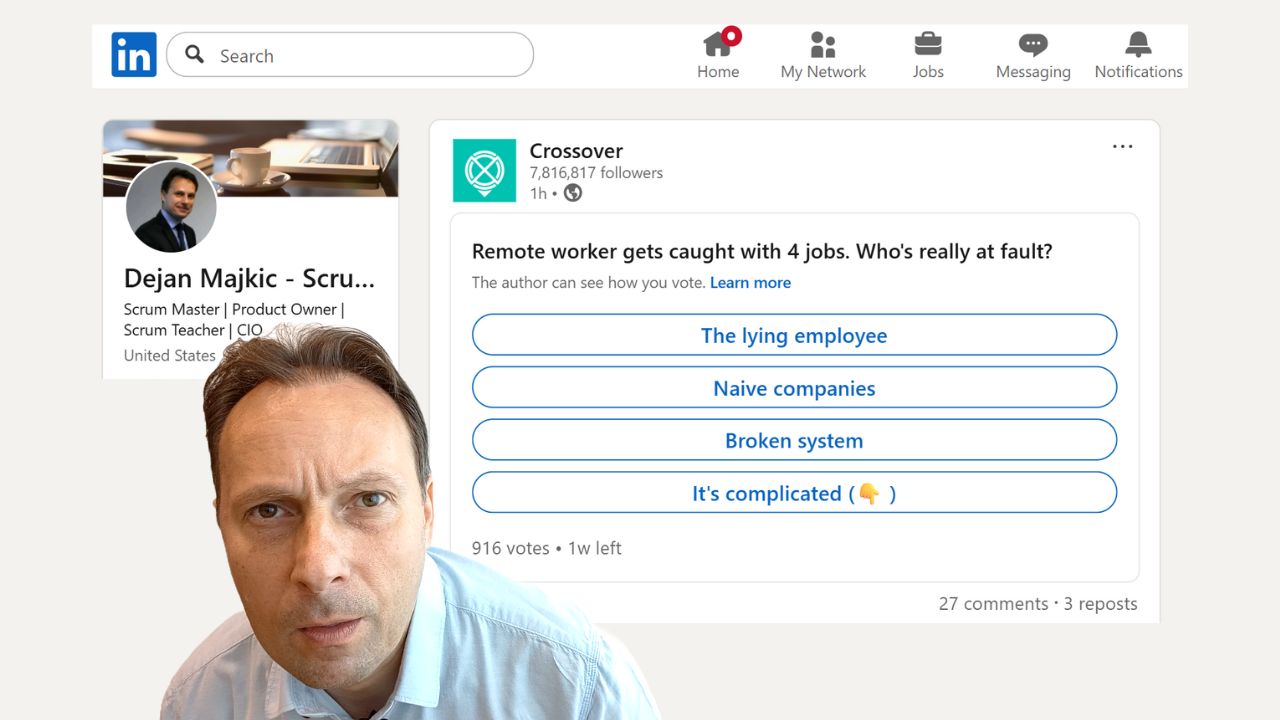The Shocking Truth About a Remote Worker Juggling 4 Jobs and Who’s Really to Blame?
A remote worker, quietly managing not one, but four side gigs alongside their main job. It’s the kind of story that makes you do a double-take, especially when it lands in your feed from Crossover, with its 7.8 million LinkedIn followers. As a software tester, I couldn’t help but dive into their recent poll:
“Remote worker gets caught with 4 jobs. Who’s really at fault?”
Before we dig in, consider leveling up your own skills.
Check out Software Testing Mastery in Scrum for practical training. These skills aren’t just for a testing career; they sharpen your ability to spot details, solve problems, and think critically, assets in relationships, finances, and everyday decisions, as you’ll see in this story.
The buzz in the comments was electric, with opinions ranging from fierce support to outright condemnation. Let’s explore a few reactions before I share my take, blending curiosity with a professional lens.
What People Are Saying…
The discussion lit up with diverse views. Sharbali Chakravarty, a Head Mistress, argued, “Unless the quality is hampered, what’s the problem? Why can’t a person use their labor?” She saw it as a fair way to earn more without corruption. Clint Griffin, a marketing consultant, echoed this, asking, “If the jobs are about outcomes and not hours, and the outcomes are met, is there a problem?” Others, like Anja Milovanović from HR, flipped the script: “Why would anyone be at fault if they’re delivering what’s expected? Companies that don’t pay living wages are to blame.” Meanwhile, Maria Del Medico called it “wholly immoral,” suggesting charges if possible, while Teoman İ., a Senior Software Engineer, shrugged, “If you can fulfill your duties and do 3 more jobs… who cares?”
These takes highlight a split: some see hustle as ingenuity, others as betrayal. It’s a perfect springboard for my analysis.
Why Software Testers Take This Seriously?
As software testers, we approach questions like this with extra scrutiny. Every detail matters; miss one, and a bug could crash the system. This situation is no different; it’s a complex puzzle with multiple interpretations. Is the worker a hero maximizing their skills, or a risk undermining their main role?
The ambiguity drives us to ask clarifying questions:
Who are they?
What are the jobs?
How do they impact performance?
Without answers, assumptions lead to misjudgments. Our training demands we dig deep, ensuring all angles, policy, ethics, and outcomes are tested thoroughly to uncover the truth.
Who Is This Multitasking Mystery Worker?
As a software tester, I’m wired to dig into details. Who is this worker? Are they a QA pro like me, a developer, or something else? How long have they been with their main employer? What are these side gigs, freelance testing, coding, or unrelated fields?
How many hours are they logging, and why? Is it to pay off debt, save for a goal, or chase a passion? These questions reveal intent, which is key to understanding their actions.
The Impact on the Day Job
Focus is my bread and butter; miss a bug, and the whole system falters. Are these side jobs tanking their performance, letting defects slip through, or are they still crushing it? Have employers noticed a dip or a conflict of interest, like testing for a rival? If quality holds, it’s a testament to their skill. If not, it’s a problem I’d catch in a heartbeat.
Company Policies
Does their employer have a side-gig policy? As a tester, I’d scrutinize the contract for disclosure rules. If it’s a hard “no” and they hid it, the fault leans toward the worker. But if policies are murky or unspoken, the company’s lack of clarity might share the blame. Communication, or the lack of it, could be the real issue.
A Balanced View
Let’s imagine the worker is a mid-level tester, juggling QA freelance gigs and odd jobs, logging 60 hours a week to clear student loans. Performance is decent but slipping, and no side-hustle policy exists. Is it their fault for not disclosing, especially if the quality dips? Or the company’s unclear rules and possibly skimpy pay?
Industry norms show multitasking is common in tech freelancing, yet loyalty is expected. External factors, like a tough economy or personal needs, might also push this behavior. Legally, if IP was leaked, that’s a red line. Ethically, it’s about fairness on both sides.
Finding a Way Forward
As a tester, I’d propose solutions: flexible hours for side passions, better pay to reduce the need, or growth paths to keep them engaged. Regular feedback loops could catch issues early. This is about a system that balances ambition and accountability.
The comments show a world divided, but as a tester, I see a chance to debug this setup. Whose fault is it? Drop your thoughts below, let’s keep the conversation rolling!
And if you’re inspired to master these analytical skills, explore Software Testing Mastery in Scrum. Beyond testing, these skills enhance your life. Think spotting red flags in contracts, managing personal budgets with precision, or resolving conflicts with clear logic.
Start today and see the difference!
